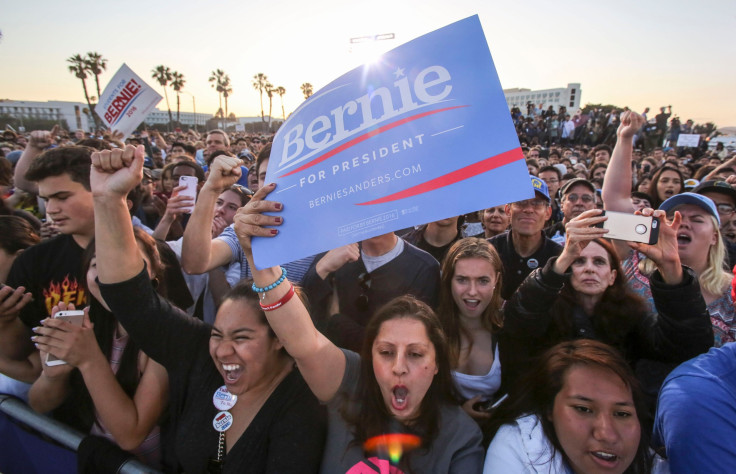How Bernie Sanders’ Wall Street Reform Agenda Could Survive Past The Democratic Primary

Even if Bernie Sanders fails to win the Democratic presidential nomination, his financial reform agenda may find new life after the primary. On Tuesday, a new progressive group announced that it would continue to push for some of the Wall Street regulations that Sanders has championed.
The newly formed coalition Take on Wall Street is not affiliated with Sanders, and its supporters include organizations that have endorsed rival Hillary Clinton. But its stated goals include some of the Sanders campaign's signature proposals, such as a financial transaction tax and reinstatement of Glass-Steagall, a regulation that prohibited commercial banks from getting involved in investment banking. Take on Wall Street also wants the U.S. Postal Service to provide low-cost banking services — another item on Sanders' campaign agenda.
Partners in the Take on Wall Street coalition include powerful labor organizations like the AFL-CIO, advocacy groups such as Democracy For America, think tanks like the Economic Policy Institute, and one or two progressive media outlets such as The Nation. Membership is divided between groups that have endorsed Sanders, backers of Clinton, and organizations that have not formally taken a position.
Clinton has proposed a tax on high-frequency trading but not on more general financial transactions. She opposes reinstating Glass-Steagall and has not taken a position on postal banking. But she does support some elements of the Take on Wall Street agenda, such as closure of the carried interest loophole.
"One thing that’s notable about Take on Wall Street is that it involves some of the strongest supporters of Sen. Sanders and some of the strongest supporters of Secretary Clinton, in a shared effort to make rewriting the rules of the rigged economy a top priority for the country as a whole," said Take on Wall Street spokesperson Jon Green in a statement to International Business Times. "When the dust settles from the election, whoever is in the White House and whichever party controls Congress, our leaders must have a mandate to act on these issues and make sure that the financial system serves the broader economy, not the other way around."
Financial reform expert Mike Konczal, a fellow at the liberal Roosevelt Institute, told IBT that Take on Wall Street's agenda is "a strong, robust, next-step financial reform agenda."
"If a candidate could sign off on this checklist, it's a really good litmus test for how good they're going to be on the financial sector," said Konczal. "Because there are clear commitments. There are things people can understand, and they're things that would do a lot of good."
Even if the Take on Wall Street agenda were fully implemented, said Konczal, there would still be more to be done. But he described the group's list of objectives as "a good step" and one that addresses all the main points that need to be considered.
"I think forming around this kind of agenda is really important," he said.
© Copyright IBTimes 2025. All rights reserved.






















